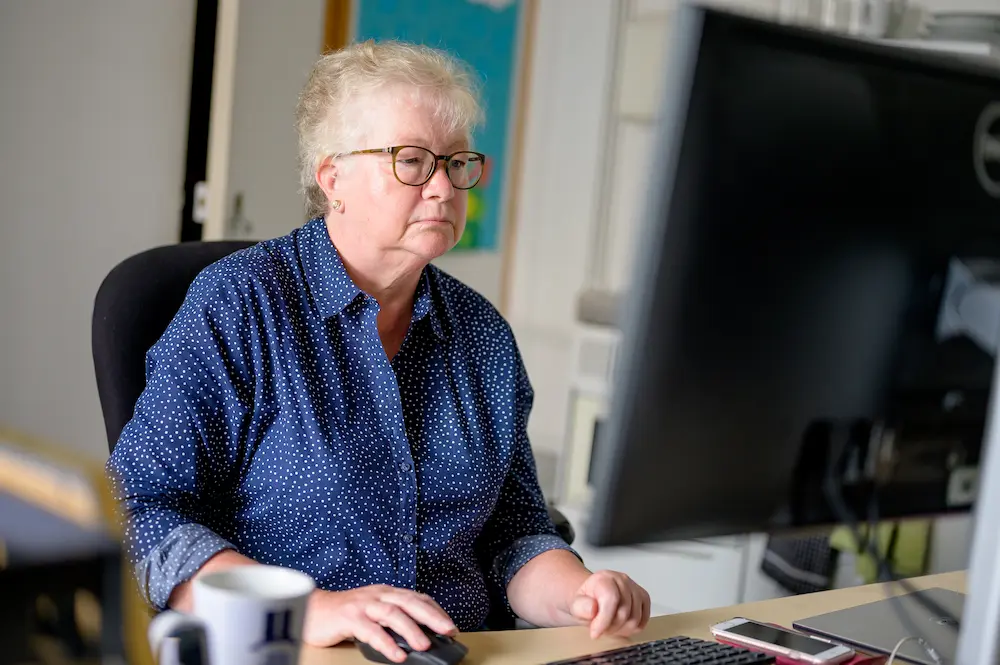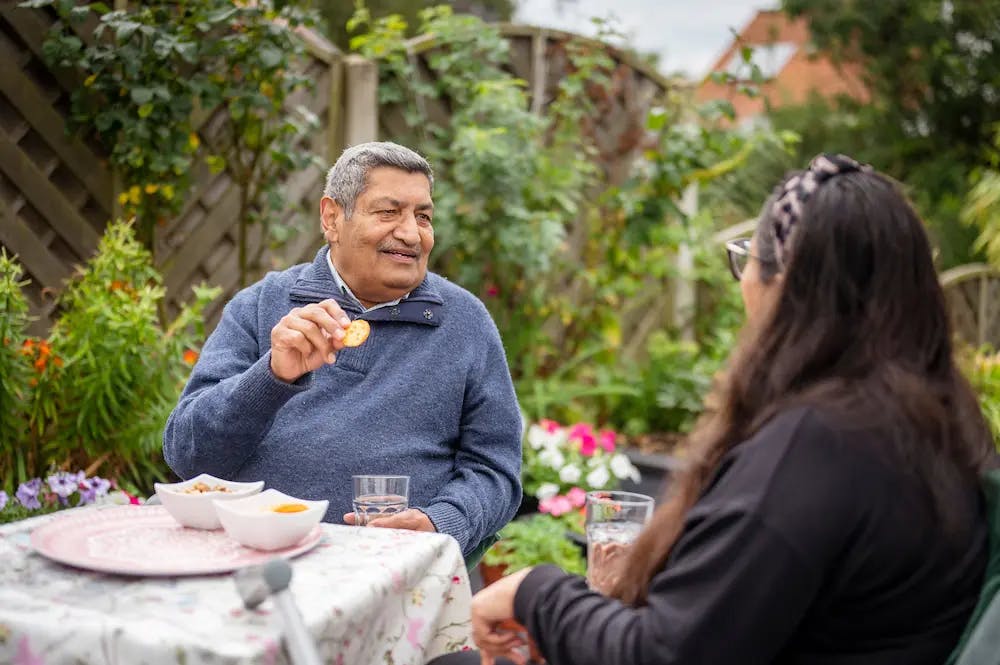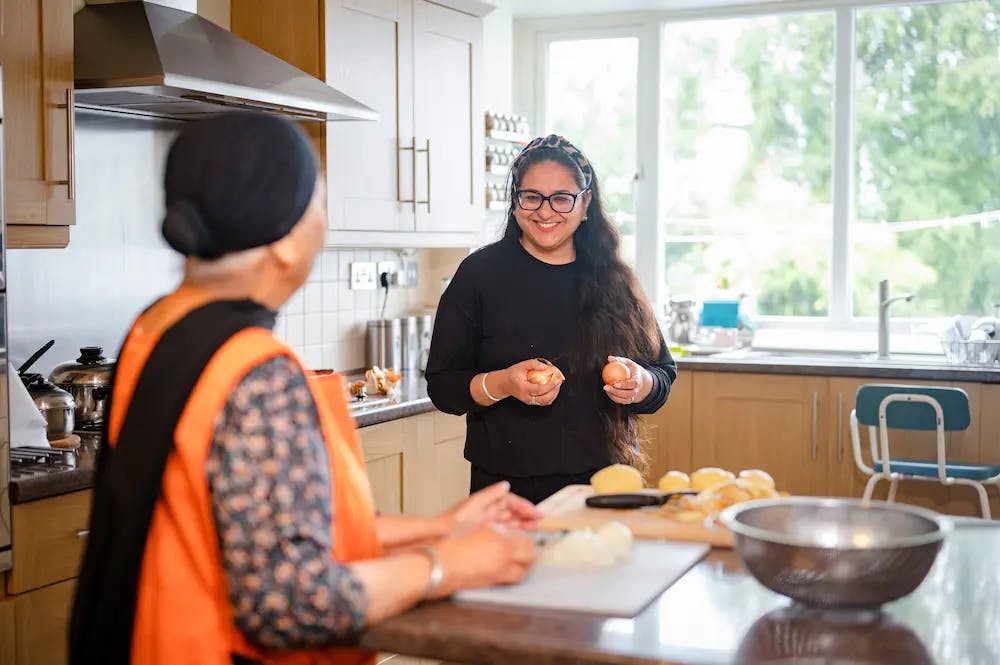Dignified and Supportive At-Home Hospice Care For Your Loved One

Estimated Reading Time: 9 minutes
This article was reviewed by Hannah Karim, Customer Care Lead at Lottie, on 18th December 2024. Hannah Karim has over three years of experience within the care sector and works closely with families to ensure they find the right care option. Hannah has received training from organisations such as Mind and The National Bereavement Service, and is also a certified Dementia Friend. Next review due December 2025.
If your loved one is sadly nearing the end of their life, at-home hospice care can provide support within the familiarity of their own home, and relieve any symptoms such as pain or discomfort.
There are several national care at home agencies, like Noble Live-In Care and Trinity Home Care, that provide hospice care. We’ve shared what to look for when searching for at-home hospice care, the cost, and what to expect for both your loved one and your family.
Arrange compassionate at-home hospice care
Browse hospice home care in your area.
In this article:
- What is at-home hospice care?
- How is hospice care different from palliative care and end-of-life care
- What care, support and services are provided through at-home hospice care?
- What to expect when receiving at-home hospice care
- Does your loved one require at-home hospice care?
- Who pays for at-home hospice care?
- Benefits
- Find at-home hospice care near you
What Is At-Home Hospice Care?
At-home hospice care is suitable for anyone living with a serious or terminal illness. Through at-home hospice care, your loved one will be looked after within the comfort of their own home.
Hospice care is given when someone isn’t going to recover from their illness or condition.
The goal of at-home hospice care isn’t curing someone of their condition, but managing symptoms and easing any pain or discomfort your loved one may be experiencing. Physical, emotional, spiritual and practical support are all offered, tailored to your loved one’s needs and wishes.
Hospice care is also similar to palliative care and end-of-life care.
How Is Hospice Care Different From Palliative Care?
Palliative care is a specialised form of care for people living with a chronic condition. The aim of palliative care isn’t necessarily to cure conditions, but to manage symptoms and make life as comfortable as possible. Emotional support is also provided for the person receiving care, their friends, family and carers.
Anyone can receive palliative care, regardless of the stage of their condition.
Meanwhile, hospice care is given towards the end of someone’s life, usually during the late stage of a condition such as dementia.
Hospice care and palliative care can both be given at home, in a care home, or in a similar setting.
How Is Hospice Care Different From End-of-Life Care?
End-of-life care is for someone nearing the end of their life.
There’s no set time when someone can begin receiving end-of-life care, while people generally start receiving hospice care when a medical professional says they have six months or less left to live, although it can be given for as long as needed.
Just like with palliative care, both can be given at home, in a care home or similar setting.
What Care, Support and Services Are Provided Through At-Home Hospice Care?
The main aim of at-home hospice care is to manage pain, discomfort and any other symptoms your loved one is experiencing.
This can be done through things such as:
- Physiotherapy
- Occupational therapy
- Other types of therapy to make your loved one more comfortable, such as massages
- Emotional support for the person receiving care and anyone around them, such as family, friends or other carers. This can extend to spiritual support if wished for
- Respite care, which allows family members and any other carers to take a brief break from any caregiving duties
- Making you aware of what other support is available, such as benefits like Attendance Allowance or Personal Independence Payment

We can help you find the best palliative care at home for your or your loved one’s care needs. Request a free list of home care agencies, and our care experts will match you with suitable carers with availability in your local area.
What to Expect When Receiving At-Home Hospice Care
Hospice care is often provided by a team of experts. This team could include:
- Your GP
- Community nurses
- Medical professionals
- Therapists
- Social workers (who provide emotional support to everyone involved)
- Home care assistants and personal care assistants
- Therapists
Once at-home hospice care has been arranged, your doctor, carers and therapists will work together to create a plan tailored to the care and support your loved one needs.
This team will work closely with other caregivers and family members to develop a comprehensive care plan encompassing your loved one’s needs and wishes.
Regular home visits will then be scheduled to provide whatever care and support is needed. A carer may also move in with your loved one on a full-time basis, depending on their needs.
Does Your Loved One Require At-Home Hospice Care?
People often start receiving at-home hospice care when they’ve been diagnosed with a terminal illness or condition and have six months or less to live.
Below are indicators that your loved one’s symptoms are becoming greater, so they may need additional care:
Their condition is progressing - Despite ongoing care and support, your loved one’s condition may continue progressing, meaning hospice care would now be beneficial
Their symptoms are becoming more challenging to manage - Your loved one may be experiencing symptoms which are difficult to manage without specialist support, such as pain, shortness of breath or fatigue
They’re less active on a daily basis - Hospice care at home can include support with personal care like bathing, dressing and getting in and out of bed. Your loved one may need extra help with their personal care, along with household tasks such as cooking and cleaning
They’re eating less and have lost weight - A smaller appetite and weight loss are common signs of somebody with an advanced illness or condition
They regularly go to the hospital - If your loved one’s condition is no longer responding to hospital treatments or those provided in a different specialist facility, hospice care may be the best option
At-home hospice care may also be the right choice for your loved one if they wish to receive support which focuses on comfort and quality of life, rather than aggressive medical treatments to try and prolong their lifespan.
Who Pays For At-Home Hospice Care?
Hospice care is usually paid through a combination of NHS funding and public donations, so you won’t need to pay for it yourself.
When receiving hospice care at home, your loved one should be assessed for NHS continuing healthcare. This is for people with intense and complex needs. If eligible for this, the NHS will fully fund the care your loved one receives.
People who receive hospice care or end-of-life care are usually eligible for NHS continuing healthcare.
Another option is NHS-funded nursing care. This is for people who live in a nursing home. Here, the NHS contributes to your loved one’s care.
Financial assessment
If you don’t qualify for NHS continuing healthcare for whatever reason, you can get a financial assessment. This works out the total value of your savings and income to determine if you qualify for local authority funding when paying for care, or if you’ll be classed as a self-funder.
A financial assessment immediately follows a care needs assessment, and you can apply for a care needs assessment by social services here.

Carer’s assessment
Anybody caring for your loved one could be eligible for local authority assistance or other benefits. Eligibility for these benefits is determined through a carer’s assessment.
You could be eligible for Carer’s Allowance. This benefit is for anyone earning less than £196 a week and spending at least 35 hours caring for one person. Your loved one needs to receive a disability benefit, such as Attendance Allowance or Personal Independence Payment, for you to be eligible.
The Benefits of At-Home Hospice Care
Comfort and familiarity - Spending the final days, weeks or months of their life in familiar surroundings will boost your loved one’s wellbeing and help them feel happy and comfortable
Personalised care and symptom management - At-home hospice care allows for a personalised approach to treatment and support. Care is tailored to your loved one’s specific needs and symptoms
Emotional support - The emotional support network provided by family and friends to somebody in their last days, weeks or months is invaluable. The presence of family and friends can help reduce any feelings of loneliness or anxiety for your loved one during a difficult time
More control and independence - When your loved one receives at-home hospice care, they’ll be able to maintain more control and autonomy over their daily life. They can spend time doing the things they enjoy, be easily visited by family members and make choices about their care
Support for family caregivers - Hospice care at home also benefits any family caregivers. Support and guidance are often available, including education and practical assistance, to reduce any stress felt due to caregiving responsibilities
Find At-Home Hospice Care Near You
Many home care agencies we list offer dignified and compassionate at-home hospice care.
Noble Live-In Care is a nationwide provider of live-in care services, while Trinity Homecare offers domiciliary care, live-in care and overnight care. Both of these providers will give your loved one a fantastic standard of hospice care at home.
We’re also partnered with Helping Hands who provide hospice care services throughout the UK, including in the cities of Birmingham, Bristol, Cambridge, Derby, Leeds, Liverpool, Newcastle, Oxford, Sheffield, Swansea and York.
Each of our partner pages states whether they accept private, local authority or NHS-funded care.

You can also speak to your GP to see locally available services. Find your nearest GP here.
Explore The UK’s Best Home Care Agencies:
Use Lottie to find the best care agency in the UK by price, care types available and more:
Home care agencies in Liverpool
Home care agencies in Birmingham
Home care agencies in Milton Keynes
Home care agencies in Sheffield
Frequently Asked Questions
When does hospice care at home begin?
Hospice care begins when your loved one’s condition or illness is classed as terminal, meaning they won’t recover from it, and a medical professional has said they have six months or less left to live.
Hospice care isn’t continuous though. People can sometimes receive hospice care, then take a break if their condition temporarily improves, before receiving it again at a later date.
How long do people receive hospice care at home for?
The length of time hospice care is given varies from person to person, depending on individual conditions and circumstances.
Generally, hospice care is started when someone has around six months left to live. Some people will receive it for just days or weeks, while others may receive it for several months.




